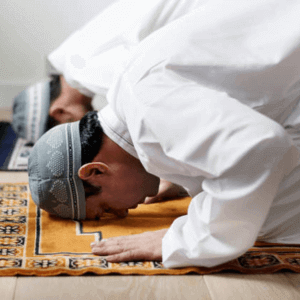Namaz (Salah)
Namaz, also known as Salah, is the second pillar of Islam and refers to the ritual prayers performed by Muslims five times a day. These prayers are a direct link between the worshiper and Allah. Performing Salah is a fundamental act of worship and a means of seeking guidance, forgiveness, and blessings.
The Five Daily Prayers
- Fajr: Performed before dawn.
- Dhuhr: Performed after midday.
- Asr: Performed in the afternoon.
- Maghrib: Performed just after sunset.
- Isha: Performed at night.
Each prayer consists of a set number of units (rak’ahs), and during each unit, specific actions and recitations are performed, including standing, bowing, prostrating, and sitting. The recitations include verses from the Quran and specific supplications.
Importance of Namaz
Namaz is a cornerstone of a Muslim’s daily routine and spiritual life. It serves as a constant reminder of the presence of Allah and reinforces discipline and mindfulness. It is also a time for personal reflection and a means of attaining spiritual growth and tranquility.
Dua e Qunoot
Dua e Qunoot is a special supplication recited in the Witr prayer, which is part of the Isha prayer and is performed after the obligatory Isha prayer. The Witr prayer is highly recommended (Sunnah) and can be performed with one, three, five, or more odd-numbered rak’ahs.
Recitation of Dua e Qunoot
Dua e Qunoot is typically recited in the final rak’ah of the Witr prayer, either before or after the ruku (bowing position), depending on the Islamic tradition followed. The supplication seeks Allah’s guidance, support, forgiveness, and protection from misdeeds and calamities.
Dua e Qunoot
Here is a commonly recited version of Dua e Qunoot:
